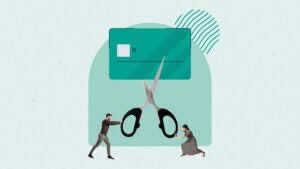How to improve your credit with student loans

Key takeaways
- A student loan can also diversify your credit mix, which can improve your credit
- Paying your student loans back on-time can also improve your credit
- Late or missed payments on your student loans can negatively impact your credit
Paying back thousands or tens of thousands of dollars in student loans can take years, and it can take a toll on your finances. But while student loan debt can be a burden, it can also help you build credit. Here are a few ways that student loans can give your credit a boost.
How to improve your credit with student loans
Your credit score represents your creditworthiness, affecting everything from interest rates on credit cards to your ability to rent an apartment. If you have student loans, there are a few things you can do to ensure that you’re building and improving your credit.
Pay on time
Because payment history makes up such a large part of your credit score, stay on top of your student loan payments. Making timely payments is one of the best ways to use your student loans to build credit. You’ll begin to see your credit score rise over time.
To help you stay on track, set up autopay with your lender. Doing so will ensure that you pay on time every month and could also get you an interest rate discount.
If you’re having trouble making monthly payments, consider adjusting your repayment plan. With federal student loans, you can sign up for an income-driven repayment plan to lower your monthly payment, or you could apply for deferment or forbearance to temporarily pause payments without affecting your score. Refinancing private student loans into a lower interest rate or monthly payment could also help you manage your loans month to month.
Diversify your credit mix
While you should never take on student loans with the sole intention of improving your credit score, they can diversify your credit mix — the number of different types of credit in your name. For instance, if you have both a student loan and a credit card open at the same time, your credit score may see a bump.
Note that doing this only makes sense if you can comfortably afford to repay the student loans in addition to other debt payments. Otherwise, you’re more likely to miss a payment, pay late fees and potentially harm your credit.
Make many years of timely payments
Your credit score will rise along with the average age of your accounts. Having accounts open for many years could improve your credit score over time.
Federal student loans have a standard repayment term of 10 years, and private student loans often have options ranging from 10 to 20 years. Making payments on your student loans for that time will boost your score, especially if you’re new to credit.
The biggest factors that affect your credit score
Your credit score is determined by how responsibly you use your credit and how long you’ve had it. FICO Scores are broken down into the following categories:
- Payment history (35 percent): The timeliness of your past payments.
- Amounts owed (30 percent): The percentage of your available credit that you owe at any given time.
- Length of credit history (15 percent): The average length of your credit accounts and how long it has been since you’ve used your accounts.
- Credit mix (10 percent): The number of different types of credit you hold.
- New credit (10 percent): How frequently you open new accounts.
Frequently asked questions
-
If you don’t pay your bill on time, a lender can report your late payments to the three major credit bureaus — Equifax, Experian and TransUnion. As a result, this can cause serious harm to your credit score. In addition, if you default on your student loans, it can cause even more damage.
-
“There’s a little-known component of FICO’s credit scores that rewards consumers who are paying down installment debts, like student loans, mortgages and auto loans,” says John Ulzheimer, Consumer Credit Expert, formerly of FICO, Equifax and Credit.com.
“Once you finish paying off installment debt, you no longer get that small credit score benefit. That’s why you could have a slightly lower credit score after paying off your student loan.”
But the good news is that this drop is only temporary — your credit score should recover and might even increase if you practice good credit-building habits, like paying down debt and paying all of your bills on time. -
When you apply for a private student loan, Grad PLUS Loan or Parent PLUS Loan, a creditor performs a hard credit inquiry to assess your credit health, which can temporarily ding your credit score by a few points.
Why we ask for feedback Your feedback helps us improve our content and services. It takes less than a minute to complete.
Your responses are anonymous and will only be used for improving our website.
You may also like

How to build credit as a college student


How to build credit without going into debt



